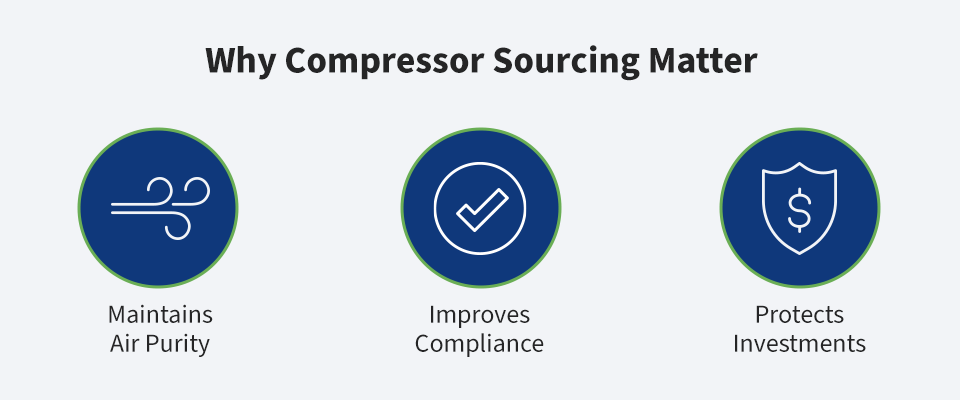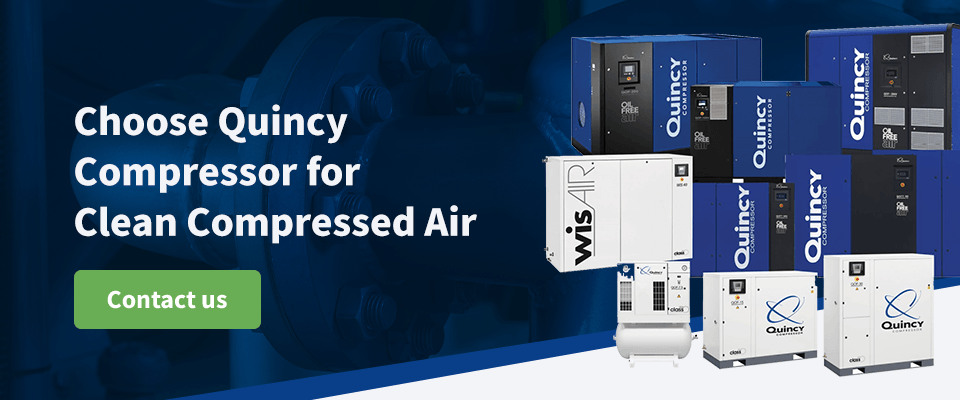Los sistemas de aire comprimido son la columna vertebral de decenas de industrias. Son versátiles, eficientes y eficaces, pero la contaminación por aire comprimido puede provocar una mala calidad del aire. Cuando la pureza del aire comprimido cae, se enfrentan daños en el equipo y violaciones normativas. Debes entender la contaminación por calidad del aire y cómo prevenirla para proteger tu equipo de uso final y mantenerte productivo.
¿Qué son los contaminantes por aire comprimido?
Los sistemas de aire comprimido están diseñados para suministrar aire limpio a los equipos. Sin embargo, las impurezas pueden entrar en el sistema, afectando al rendimiento y a la calidad del producto. Las instalaciones deben monitorizar los sistemas de aire comprimido para detectar estas contaminaciones y así evitar ineficiencias.
Humedad
La humedad del aire húmedo entra en el sistema, condensándose a medida que aumenta la presión interna. Aunque pequeñas cantidades pueden ser inofensivas, el exceso de agua puede causar daños. Los sistemas de aire comprimido necesitan un secado adecuado para evitar la corrosión, el desgaste de las herramientas y el crecimiento microbiano. Cuanto más tiempo tenga que acumularse la humedad, más problemas verás. Si hay suficiente humedad y crecimiento de moho, incluso podrías haber infracciones de seguridad del producto.
Petróleo
La contaminación por aceite ocurre con compresores inyectados en aceite. A veces, los vapores de aceite evitan la filtración, comprometiendo tu entorno estéril. Incluso cantidades de aceite traza pueden provocar interferencias en el recubrimiento y desgaste prematuro del equipo. Busca compresores sin aceite o soluciones de filtración y mantenimiento de calidad para proteger tu operación.
Sólidos
El polvo, la suciedad y las partículas de óxido son todas amenazas de contaminación. Las impurezas sólidas entran en un sistema de aire comprimido a través del aire de admisión o se desarrollan internamente a medida que los componentes se desgastan. Los sólidos obstruyen las tuberías, reducen la eficiencia y dañan las herramientas. Las instalaciones deben invertir en filtración de alta eficiencia para eliminar contaminantes de sus sistemas. Esto es fundamental en industrias como la del procesamiento químico, donde partículas microscópicas pueden provocar defectos en el producto.
¿Cómo afecta la pureza del aire comprimido a tu sector?
Muchas industrias deben priorizar la calidad y la coherencia para proteger sus productos finales. Todos los contaminantes pueden generar problemas en equipos y productos, lo que provoca tiempos de inactividad. Cada sector debe comprender los riesgos a los que se enfrenta. Una vez que sepas contra qué te enfrentas, puedes encontrar las soluciones adecuadas para garantizar un aire limpio y seco.
Alimentación y bebidas
La industria alimentaria y de bebidas utiliza aire comprimido para el embalaje y procesamiento de productos. La humedad, el aceite o las partículas que entraran en el flujo de aire podrían afectar la calidad del producto. Las instalaciones pueden enfrentarse a retiradas, deterioro y violaciones por parte de la Administración de Alimentos y Medicamentos (FDA). La humedad favorece el crecimiento bacteriano. La contaminación por aceite y sólidos puede afectar al sabor y la seguridad del producto. El sector alimentario y de bebidas debería considerar compresores libres de aceite y filtración avanzada para combatir estos problemas.
Farmacéutica y Médica
La producción de dispositivos médicos, la fabricación farmacéutica y otras operaciones médicas necesitan aire comprimido estéril . Los contaminantes que entran en el equipo del paciente o en el contenido de los medicamentos afectan a su eficacia. Las bacterias en un espacio estéril abren puertas a complicaciones. Las industrias médicas deben cumplir con la norma ISO 8573-1 para los estándares de calidad del aire comprimido. Sistemas adecuados de filtración y secado son fundamentales para proteger la seguridad del producto y del paciente.
Producción química
La producción química depende del aire comprimido para transportar materiales y controlar procesos químicos. Cualquier contaminación puede provocar sorpresas en las reacciones químicas. También puede comprometer la consistencia del producto. Nuevas variables en el proceso generan resultados no deseados, afectando la calidad y reputación de tu operación.
Fabricación de electrónica
La fabricación de electrónica también requiere aire limpio para una producción de alta calidad. La humedad corroe las placas de circuito y los componentes eléctricos, mientras que el aceite y los sólidos interfieren con las partes sensibles. Las instalaciones deben controlar la calidad del aire comprimido para evitar estos problemas de rendimiento. Busca soluciones de filtración eficaces y productos de aire comprimido de fabricantes de confianza para recibir apoyo.
Normativas que regulan la calidad del aire en compresores
Con tanto en juego en la calidad del aire comprimido, las regulaciones son esenciales. Los líderes del sector utilizan normativas como ISO 8573-1 e ISO 12500 para promover la seguridad y la coherencia en las instalaciones. Ya sea que trabajes en alimentación, farmacéutica o electrónica, cumplir con la normativa puede proteger tu reputación y producción.
ISO 8573-1
La Organización Internacional de Normalización (ISO) es una entidad global que establece la normativa del sector. Crea estándares para cada sector, asegurando que los grupos de todo el mundo puedan trabajar desde la misma base. La norma ISO de calidad del aire 8573-1 establece directrices para la calidad del aire comprimido. Clasifica la pureza del aire según la humedad, el aceite y los sólidos.
También divide las clases de calidad del aire. La Clase 0 es la clasificación más estricta: las industrias que siguen los estándares de Clase 0 deben tener los niveles de contaminación más bajos. Cada sector tendrá una clasificación diferente. Debe mantener normas para cumplir con las directrices de seguridad y producción pertinentes.
ISO 12500
La otra regulación importante es la ISO 12500, la norma de rendimiento para filtros de aire comprimido que tratan contaminantes de aceite. Los filtros eliminan los contaminantes establecidos en la ISO 8573-1. Si los filtros no pueden eliminar los contaminantes como se pretende, no cumplen con la ISO 12500. Las industrias deben contar con filtros en los que puedan confiar para proteger sus procesos y equipos de uso final.
Por qué es importante la obtención de compresores
Si tu negocio depende del aire comprimido, debes contar con un compresor de aire de alta calidad. Conseguir aire limpio y seco requiere un sistema diseñado por expertos con filtración avanzada y un rendimiento fiable. Tener un compresor de aire asequible no es suficiente: tu instalación necesita una solución en la que pueda confiar para superar las normas regulatorias.
1. Mantiene la pureza del aire
Lo más importante es que un compresor bien seleccionado protege la pureza de tu aire. Sistemas adecuados de filtración y secado son fundamentales para evitar la contaminación. El sistema debe equilibrar la calidad del aire con la eficiencia, permitiendo que tu operación mantenga la productividad y la consistencia. Invertir en el sistema adecuado puede marcar la diferencia para tu negocio.
2. Mejora el cumplimiento
El compresor de aire adecuado ayudará a que tu instalación cumpla con la normativa. Tanto si necesitas un compresor libre de aceite como un rendimiento de filtración específico, un buen compresor de aire cubrirá estas necesidades. Una máquina mal mantenida y obsoleta puede dejar entrar contaminantes. Tu centro podría enfrentarse a inactividad y violaciones normativas, lo que te retrasará. Busca compresores de alta eficiencia de fabricantes de confianza para satisfacer las demandas regulatorias y operativas.
3. Protege las inversiones
Un socio de compresores fiable puede ofrecer servicios de mantenimiento que protejan tu inversión. Los compresores no son una selección puntual: requieren pruebas y mantenimiento continuos . Un plan de mantenimiento de un proveedor experto mantiene tu sistema en óptimas condiciones. Además, las pruebas regulares de aire comprimido te informan sobre los peligros a los que debes prestar atención. Reduces las posibilidades de problemas de contaminantes y te aseguras de que tu inversión perdure.
Elige el compresor Quincy para aire comprimido limpio
Tu instalación depende de su compresor de aire para mantener la productividad. Necesitas un compresor fiable para asegurar que el aire limpio llegue a tu proceso. Quincy Compressor es tu socio en aire comprimido, ofreciendo una gama completa de compresores de aire de alta eficiencia para tu instalación.
Vamos más allá del servicio básico. Ofrecemos compresores de aire, una selección completa de piezas y un servicio experto para que tu operación funcione sin problemas. Asociarse con Quincy Compressor significa trabajar con profesionales dedicados a optimizar tu productividad. Además, nuestras garantías líderes en el sector te ofrecen cobertura extra para compresores. Solicita un presupuesto hoy mismo para encontrar la solución de calidad del aire adecuada para tu negocio.




